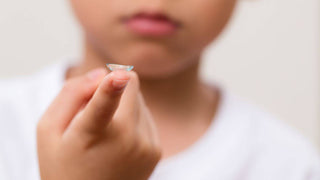Contact lenses are a popular choice for vision correction across all ages due to their comfort, ease of use, and the wide field of vision they offer. This leads to an important question: At what age is it appropriate for children to start using contact lenses?
Understanding Contact Lenses
Contact lenses serve as an effective alternative to glasses, designed to correct vision while accommodating diverse lifestyle needs. They come in various types, such as soft, hard, daily wear, and extended wear, each suited for different visual requirements and preferences.
Age Considerations for Contact Lens Wear
The decision on when a child can start wearing contact lenses isn't solely based on age. It also involves evaluating the child's maturity, hygiene habits, and their capability to handle and care for lenses responsibly. Wearing contact lenses involves a significant lifestyle change in one's daily routine. Optometrists and ophthamologists play a crucial role in making this assessment during eye health consultations.
The Importance of Vision Correction for Children
Children's visual systems are in a state of rapid development, making vision correction an integral part of their growth. Regular eye examinations are essential to ensure their eyes are healthy and functioning correctly. Vision correction may be necessary for various reasons, including improving sight, supporting the development of a weaker eye, and ensuring proper eye alignment.
Benefits of Contact Lenses for Children
Contact lenses offer several advantages, including a wider field of vision and no restrictions on physical activity, making them an excellent option for children engaged in sports. They also do not fog up or collect water droplets, enhancing clarity in all conditions. Moreover, contacts allow children to experience vision correction without changing their appearance, which can positively impact self-esteem.
When Can Children Start Wearing Contacts?
Contacts are a safe and viable option for many children, with optometrists often recommending them for those aged between 8-11 years, depending on individual maturity and readiness to undertake the responsibility of lens care.
Getting Contacts for Children
Choosing contact lenses involves a detailed eye exam to ensure the lenses fit well and correct the vision accurately. The process includes:
-
A consultation to discuss medical history and daily activities.
-
A comprehensive eye examination.
-
Determining the specific contact lens prescription.
-
A fitting session to select the appropriate lens type and size.
Caring for Contact Lenses
Proper lens maintenance is crucial for eye health. It encompasses using the right cleaning solutions, keeping the lens case hygienic, and adhering to the care instructions provided by eye care professionals.
Considerations Before Choosing Contacts
While many children may benefit from wearing contacts, they are not suitable for everyone. Factors to consider include the child's susceptibility to eye infections, any existing eye conditions, and their preparedness to manage contact lens care effectively.
What About Color Contact Lenses?
Any individual needs to be assessed for suitability for wearing normal soft contact lenses before wearing cosmetic contact lenses. Their eligibility is to the discretion of their eye healthcare provider. We do not recommend that children who have never worn soft contact lenses jump to wearing color contacts as there is a learning curve and habituation involved.
Conclusion
Introducing contact lenses to children should be a carefully considered decision. Consulting with an eye care professional is essential to determine if contacts are a suitable option based on the child's specific needs and lifestyle.


